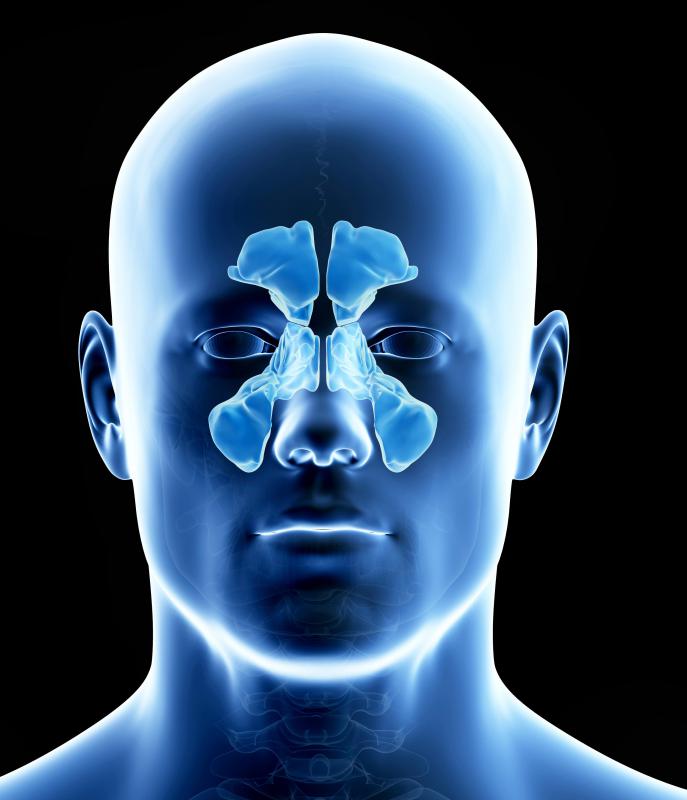At TheHealthBoard, we're committed to delivering accurate, trustworthy information. Our expert-authored content is rigorously fact-checked and sourced from credible authorities. Discover how we uphold the highest standards in providing you with reliable knowledge.
What Is the Treatment for Maxillary Sinus Cyst?
The maxillary sinus passages are located under each eye, on either side of the nose. Many experience maxillary pressure when mucus builds up due to colds or allergy season, but about one in 10 people may suffer from a maxillary sinus cyst, which might need to be surgically excised. If it does not grow too large, many doctors might just recommend a regimen of antibiotics to reduce the chances of sinus buildup during the healing process.
Cysts can develop if the ostia, or openings, to any of the various sinus cavities become blocked. This may form as a maxillary sinus cyst or in other cavities. The frontal, or bilateral, sinuses over the eyes, the ethmoid sinuses behind the eyes or bridge of the nose, and the branches of the nasal sinuses directly inside the nose all are candidates for a cyst. These growths are small pockets of tissue, often filled with pus that are usually healed naturally by the body.

A dental surgeon will need to remove a cyst in the maxillary sinuses if it becomes too large or infected. These growths often are associated with infections of the upper molars, which can spread through the tooth roots to the mucus membranes. Signs that the cyst has become infected or too large include pain or numbness of the face or neck.
A maxillary sinus cyst may be discovered without any accompanying pain or numbness during radiological imaging. Magnetic resonance imaging (MRI) or a computed axial tomography test, however, might be needed to confirm one's existence. As of 2011, a procedure known as endoscopic surgery is used when cysts are large and in need of removal; this allows doctors to insert a tube through the nose, with a light and camera at the tip. These images allow for another tube to be inserted to perform the excision without any facial scarring. If removed, it is common for the cyst to be tested for malignancy.

Whether surgery is recommended, a regimen of antibiotics is a common treatment for a maxillary sinus cyst. This should help the cyst from becoming infected or fight any infection that may already have taken root. A conquered infection also is less likely to trigger the body's natural mucus-producing response, which will ease sinus pressure.
Some at home remedies also could help treat a maxillary sinus cyst, most of which are aimed at keeping the sinuses clear and operating properly. This could be a room vaporizer or saline infusion to clear and moisturize the sinus passages. It also could involve dietary changes to improve the body's natural immunity.
AS FEATURED ON:
AS FEATURED ON:















Discussion Comments
@ Literally45: Get another doctor. You having headaches is enough reason for removal.
I discussed this with a famous dentist. He advised me to have the cyst removed and I did. Now I feel free to breathe and am taking antibiotic medicine.
I have a cyst in my left sinus! I've been to two doctors who work in the same office. I also have some dental problems and I have lost low end hearing in my right ear. I'm a musician and this has totally changed my life. I've been treated like I'm overreacting. If anyone has any ideas to help me, please let me know. Is this something I just have to live with? I live in Idaho.
@turquoise-- You've made a good point. Retention cysts can usually drain on their own and they will heal and shrink. Taking antibiotics is usually enough during this process. If the cyst can't heal on its own, then surgery can be considered.
@literally45-- If the cyst is not large or infected, I think doctors do prefer to leave it alone. But if it's causing you migraines, you should probably have it removed.
I also had terrible migraines and they disappeared after the maxillary sinus cyst removal. I get a headache now and then, but it's not a big deal.
I didn't really have the option of not having the cyst removed though because my cyst was infected and it couldn't drain on its own because my sinus was blocked.
I have a cyst in my maxillary sinus. I want to have it removed but my doctor thinks that it's not necessary right now. The cyst isn't big and it doesn't affect my breathing, but it does give me migraines.
I'm thinking about seeing another doctor because I think I prefer to have it removed rather than wait for it to get larger.
Has anyone else been in this situation?
Post your comments